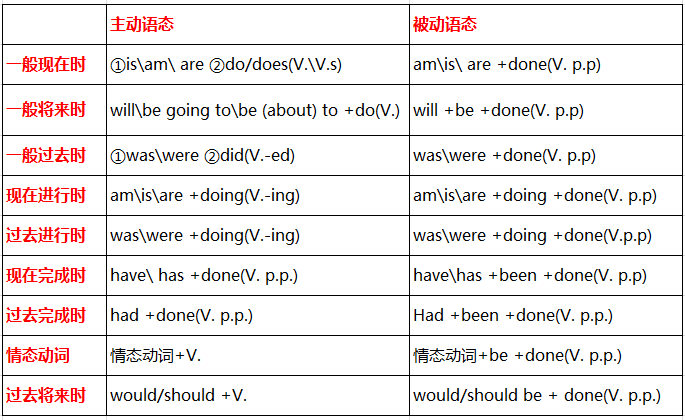基本介紹
- 作品名稱:英語被動語態
- 外文名稱:passive voice
- 語態分類:主動語態和被動語態
- 定義:被動語態表示主語是動作的承受者
結構,語法要點,句型概述,特殊情況,時態問題,注意事項,變換規則,新興形式,
結構
英語被動語態的構成通常是:“be+done”。但“get+done”也可以構成被動語態,用這種結構的句子側重於動作的結果而不是動作本身。如: The man got hurt on his way home. 那個男人在回家的路上受傷了。 How did the glass get broken? 杯子怎么破了?
例如:Chinese is spoken by many people. 中文Chinese是動詞speak的承受者。被例如中文常說:我被他打,這就是一種被動。但有時由於句子結構上的需要也要用被動,例如It is not unusual for workers in that region to be paid more than a month it 在句中作形式主語。而不定式to be paid more than a month是句子的邏輯主語。結合選項全句的意思是:“那個地方的工人一個多月後才得到工資是常有的事”。
語法要點
被動:主+p.p.+by+賓格
一般現在時:主 + is/are + v.[pp.] (+by +人賓)
一般過去時:主 + was/were + v.[pp.] (+ by +人賓)
現在完成時:主 + have/has + been + v.[pp.] (+ by +人賓)
☆有情態動詞的被動:主 + 情 + be + v.[pp.] (+ by +人賓)
情態動詞:can、should、must
TENSE | 主動語態 | 被動語態 |
1. be. 2. V.\V.s | am\is\are+(p.p) | |
will\be going to | will be +(p.p) | |
am\is\are+V.ing | am\is\are+being+(p.p) | |
①was\were②V.ed | was\were+(p.p) | |
have\has+V.p.p | have\has+been+(p.p) | |
過去完成時 | had+V.p.p | had+been+(p.p) |
過去進行時 | was\were+V.ing | was\were+being+(p.p) |
情態動詞+V. | 情態動詞+be+(p.p) |
句型概述
①(,一般將來時):am, is, are, was, were, is going to be , will be+done . 例如: Once environmental damage is done, it takes many years for the system to recover. 本句的意思是:“環境一旦遭到破壞,需要多年時間才能恢復過來。”do作為及物動詞有“引起,產生”的含義,do damage的意思是“造成破壞”。主語damage是及物動詞do的動作對象,謂語應當用被動語態。
④ 其他時態以此類推,可得到結果。
⑥不定式的被動語態:to be done例:The no-shows have to be considered when deciding the rate of overbooking.(確定超過接待能力的預定時必須考慮預定了房間卻來不了的客人。
特殊情況
① 有些動詞在主動結構中,後面接不帶to的不定式,但如果改為被動,則需把省略的to加上,這類動詞有 [let, make, have,help]和感官動詞[feel,see,hear,watch,look at,listen to],如:The boss made my grandfather work 10hours a day.改成My grandfather was made to work for 10 hours a day.
② 含有賓語從句的主動結構變為被動,通常用it作為被動結構的先行主語,從句放在句子後面/也可採用另一種形式,這類動詞有:know, say, believe, find, think, report等
③ 不是所有的主動句都可以變換成被動句,更不是所有的被動句都可以自由變換成主動句。雖然語法原則上允許主動和被動句的互相轉換,但有的句子轉換後會變成不通順或不地道的英語句子。因此,在某些題目里,這也成為判斷應該用主動還是用被動的依據。
例:At 5:05 p.m. on Saturday 19th July , there was an accident at the junction of the Main Street and Panda Road when a boy was knocked down off his bicycle by a delivery van. The boy was sent to St. Maria Hospital where he was treated for shock and a broken arm.
在這段文章里,a boy was knocked down off his bicycle by a delivery van這句被動句強調出讀到文章的人最關心的事故的受害者。The boy was sent to St. Maria Hospital這句話則說明了孩子被送到醫院的事實,至於是由誰(某個過路人?或肇事司機?)送的不重要。he was treated for shock and a broken arm這句被動句無須說出treat這個動作的發出者,因為在醫院,傷病員自然由醫務人員處理,無須囉嗦。這樣,這段文章就重點突出,條理清楚了。
④ 有些動詞可以有兩個賓語,在用於被動結構時,可以把主動結構中的一個賓語變為主語,另一個賓語仍然保留在謂語後面。多是把間接賓語變為主語。這樣句子自然些。直接賓語變為主語時,間接賓語要變為某個介詞的賓語,介詞to可以省略。如His father left him this house.改為This house was left (to) him by his father.
⑤ 有些動詞雖為及物,但賓語並非是動作承受者,不能轉換,這些動詞有have, hold(容納),suit, fit, lack, become(適合)contain, cost, last, mean, suffice(足夠)等。
⑧ 在一些固定說法中,有些名詞和動詞結合的固定說法,不能改We Chinese always keep our word.
⑨ 某些從不及物動詞轉化來的及物動詞,直接賓語在表示動作的方式或效果時,這些動詞在意思上起狀語的作用,沒有被動The girl kissed her boyfriend good night=The girl said good night to her boyfriend by kissing him.(這個女孩說了晚安並且親了他的男朋友)
⑩ 表地點\處所\組織\長度\大小\數量\程度\抽象名詞的詞做賓語時不用被動.
⑪ 某些“不及物動詞+介詞”短語walk into, listen to, sleep in, agree with, shake hands with, belong to, take part in, keep up with不能用被動。
⑫ 某些詞用主動表被動:sell, miss, build, grow, smell, taste, sound, feel等
時態問題
1.一般現在時的被動語態構成:is / am / are + 及物動詞的過去分詞
Our classroom is cleaned everyday.
I am asked to study hard.
Knives are used for cutting things.
2.一般過去時的被動語態構成:was / were + 及物動詞的過去分詞
A new shop was built last year.
Dinosaur eggs were laid long long ago.
This book has been translated into many languages.
Many man-made satellites have been sent up into space by many countries.
4.一般將來時的被動語態構成:will/shall+ be + 及物動詞的過去分詞
A new hospital will be built in our city.
Many more trees will be planted next year.
5.含有情態動詞的被動語態構成:情態動詞+ be + 及物動詞的過去分詞
Young trees must be watered often.
Your mistakes should be corrected right now.
The door may be locked inside.
Your homework can be handed in tomorrow.
Uncle Wang is mending my bike now.→
My bike is being repaired by Tom now.
They are planting trees over there. →
Trees are being planted over there by them.
7.不定式的被動語態:to + be + 及物動詞的過去分詞
There are two books to be read. →
There are twenty more trees to be planted.
8.過去將來時的被動語態:would /should+ be + 及物動詞的過去分詞
He said he would finish the work soon.
He said the work would be finished soon by him.
注意事項
1.不及物動詞無被動語態。
The dinosaurs disappeared about 65 million years ago.
2.有些動詞用主動形式表示被動意義。這些動詞主語以物居多,謂語動詞一般表示主語的性質和特徵。這類動詞有許多,如: write, break, selld等。
This pen writes well.
This new book sells well.
3.感官動詞或使役動詞使用省略to的動詞不定式,主動語態中不帶to ,但變為被動語態時,須加上to 。 感官動詞有smell,sound,taste,fell等。使役動詞有let,make,have,help,hear,see,watch,notise,look,listen.
例:make somebody do something→somebody+ be +made to do something
see somebody do something→somebody +be +seen to do something
A girl saw my wallet drop when she passed by.→My wallet was seen to drop by a girl when she passed by.
The boss made the little boy do heavy work.→The little boy was made to do heavy work by the boss.
His mother gave him a present for his birthday.→ He was given a present by his mother for his birthday.
He gave me a book.→A book was given to me by him.
He showed me a ticket.→A ticket was shown to me by him.
My father bought me a new bike. →A new bike was bought for me by my father.
We can't laugh at him. →He can’t be laughed at by us.
He listens to the radio every day. →The radio is listened to by him every day.
The nurse is taking care of the sick man. →The sick man is being taken care of by the nurse.
6.一些表示狀態的動詞沒有被動語態。如:have, belong to等。
變換規則
把主動語態改為被動語態非常簡單,可以遵循以下幾個步驟:
1. 先找出謂語動詞;
2. 再找出謂語動詞後的賓語;
3. 把賓語用作被動語態中的主語;
4. 注意人稱、時態和數的變化。
例:1. Bruce writes a letter every week. →A letter is written by Bruce every week.
2. Li Lei mended the broken bike this morning.→The broken bike was mended by Li Lei this morning.
3. He has written two novels so far.→Two novels have been written by him so far.
4. They will plant ten trees tomorrow.→Ten trees will be planted by them tomorrow.
5. Lucy is writing a letter now.→A letter is being written by Lucy now.
6. You must lock the door when you leave.→the door must be locked when you leave.

